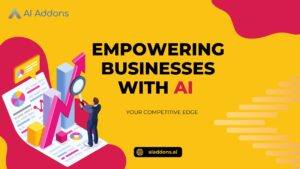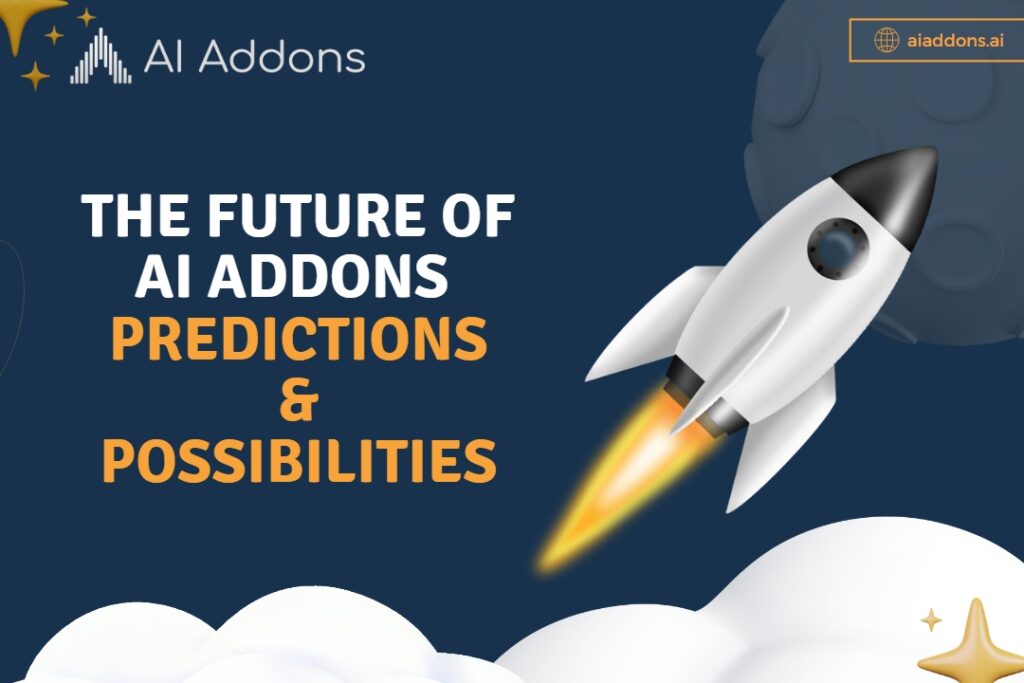Artificial intelligence (AI) has been a buzzword in the tech industry for several years now. From chatbots to predictive analytics, AI has found its way into every aspect of our lives. It has revolutionized the way we work, live, and interact with each other. With the advancements in AI, the future of AI addons is looking promising. In this blog, we will explore the predictions and possibilities of AI add-ons.
AI Add-ons: What are they?

AI add-ons are software or hardware components that enhance the capabilities of AI systems. They are designed to improve the accuracy, speed, and efficiency of AI systems. AI add-ons can be in the form of algorithms, libraries, tools, or platforms. They can be integrated into existing AI systems or can be used to build new ones.
Predictions of AI Add-ons
-
Increased Use of AI in Healthcare
The healthcare industry is expected to be one of the biggest beneficiaries of AI add-ons. AI add-ons can be used to improve the accuracy of diagnoses, predict diseases, and improve patient outcomes. They can also be used to analyze large amounts of patient data to identify trends and patterns that can help healthcare professionals make better decisions.
-
Growth of AI in Manufacturing
AI add-ons are also expected to revolutionize the manufacturing industry. They can be used to optimize production processes, reduce waste, and improve product quality. AI addons can also be used to monitor equipment and predict when maintenance is required, reducing downtime and improving efficiency.
-
Enhanced Cybersecurity
AI add-ons can be used to improve cybersecurity by detecting and preventing cyber-attacks. They can be used to monitor networks, identify threats, and respond to them in real-time. AI addons can also be used to identify vulnerabilities in software and hardware and provide recommendations for how to fix them.
-
Improved Customer Service
AI add-ons can be used to improve customer service by providing personalized recommendations and solutions. They can be used to analyze customer data and provide insights into customer behavior, preferences, and needs. AI add-ons can also be used to automate customer service processes, such as chatbots and virtual assistants.
-
Increased Automation in Agriculture
AI add-ons can be used to automate agriculture processes, such as planting, watering, and harvesting. They can be used to optimize crop yields, reduce waste, and improve efficiency. AI addons can also be used to monitor weather patterns and predict when irrigation is required, reducing water usage and improving sustainability.
Possibilities of AI Add-ons
-
Personalized Learning
AI add-ons can be used to provide personalized learning experiences for students. They can be used to analyze student data and provide insights into their learning styles, strengths, and weaknesses. AI addons can also be used to recommend personalized learning materials, such as videos, articles, and books.
-
Autonomous Transportation
AI add-ons can be used to develop autonomous vehicles that can navigate roads and highways without human intervention. They can be used to analyze traffic patterns, predict accidents, and provide recommendations for the safest and most efficient routes. Autonomous transportation has the potential to reduce traffic congestion, improve safety, and reduce emissions.
-
Enhanced Human Performance
AI add-ons can be used to enhance human performance by providing real-time feedback and recommendations. They can be used to monitor vital signs, analyze movements, and provide recommendations for improving posture, technique, and performance. AI add-ons can also be used to develop exoskeletons that can assist with physical tasks, such as lifting heavy objects.
-
Improved Environmental Monitoring
AI add-ons can be used to monitor and predict environmental changes, such as climate change, deforestation, and pollution. They can be used to analyze satellite imagery, sensor data, and other environmental data sources to identify trends and patterns. AI addons can also be used to predict natural disasters, such as hurricanes and earthquakes, and provide early warning systems.
-
Personalized Healthcare
AI add-ons can be used to provide personalized healthcare by analyzing individual patient data and providing personalized treatment recommendations. They can be used to predict diseases and conditions, recommend treatments and medications, and monitor patient progress. Personalized healthcare has the potential to improve patient outcomes and reduce healthcare costs.
Challenges of AI Add-ons
While the possibilities of AI add-ons are vast, there are also several challenges that need to be addressed. Some of the challenges include:
-
Bias in AI
AI systems are only as unbiased as the data they are trained on. If the data used to train AI systems is biased, then the resulting AI systems will also be biased. This can lead to unfair treatment of certain groups of people.
-
Data Privacy and Security
AI systems require vast amounts of data to function effectively. This data can be sensitive and private, such as medical records or financial information. Ensuring the privacy and security of this data is critical to preventing data breaches and cyber-attacks.
-
Ethical Considerations
As AI systems become more advanced and autonomous, ethical considerations become more important. Questions arise about who is responsible when an AI system makes a mistake, and what rights and protections should be given to those affected by AI systems.
-
Integration with Existing Systems
Integrating AI add-ons with existing systems can be challenging. This can require significant changes to existing processes and infrastructure, which can be costly and time-consuming.
The majority of AI predictions regard AI as a technology with enormous potential for good, but also with potential for less desired results like widespread unemployment, a declining tax base, or even the extinction of humanity. Like any instrument, the person using it will ultimately determine how it is used. Various leaders may have slightly different predictions on how AI will change the world in the future. But everyone appears to agree on these three major points:
- The world as we know it will alter because of artificial intelligence. (Everyone varies in the specifics.)
- There will be a significant danger if we ever achieve a level of superintelligence when machines actually outperform humans in every manner. (It is debatable whether or not we will ever arrive at that stage.)
- It is ethically required of both people and the companies creating these technologies to think about the effects of creating and utilizing AI.
Conclusion
AI add-ons have the potential to revolutionize the way we live and work. From healthcare to manufacturing to education, AI add-ons can improve efficiency, accuracy, and effectiveness. However, challenges such as bias, data privacy, and ethical considerations need to be addressed to ensure that AI systems are fair, secure, and trustworthy. As AI technology continues to advance, the possibilities for AI add-ons are endless, and the impact they will have on our lives is yet to be fully realized.
